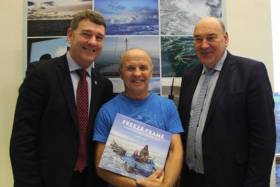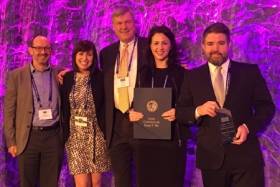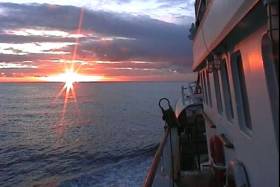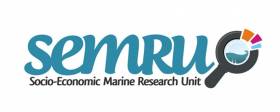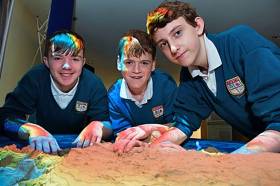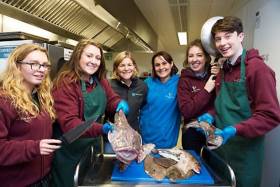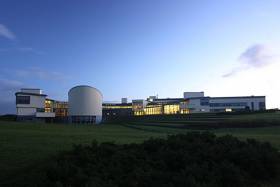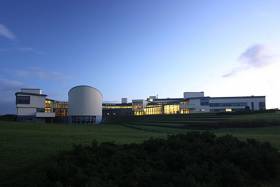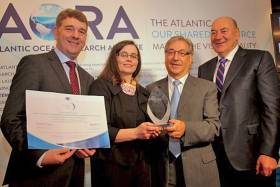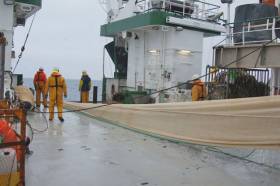Displaying items by tag: Marine Institute
Marine Institute Hosts Man Behind ‘Blue Planet’ Camera
#DougAllan - Multiple Emmy and BAFTA award-winning wildlife cameraman and photographer Doug Allan visited the Marine Institute on Wednesday (16 November) to share his remarkable insight and deep understanding of marine mammals.
Having qualified as a marine biologist, Allan now specialises in capturing spectacular footage of animals in the Arctic and Antarctic.
Spending the last 25 years bringing the most remarkable sights in the natural world into our homes, Allan has been involved in over 60 films and series such as Blue Planet, Frozen Planet and Planet Earth — the sequel to which recently began on BBC television.
To use the words of Sir David Attenborough: "Cameramen don't come more special than Doug Allan."
Allan’s awards include eight Emmys and four BAFTAs; he has twice won the underwater category in the Wildlife Photographer of the Year competition; and was awarded the Royal Geographical Society's Cherry Kearton Medal for his wildlife images. He has three Honorary Doctorates, as well as two Polar Medals.
His footage of orcas attacking grey whales, polar bears trying to capture beluga whales, and leopard seals snatching emperor penguins were the first of its kind. He has been a pioneer in both Arctic filming as well as research and has an extensive list of fascinating stories and insights.
Allan treated his audience at the Marine Institute to inspirational stories from his polar and underwater film-making career alongside some of his breath-taking images and photographs.
He told tales of how he survived encounters with polar bears, walruses and minus 40 degree temperatures to capture images of the planet's most majestic animals, above and below the ice.
Allan’s visit capped off a 17-date tour of the island of Ireland with his new show ‘In the Company of Giants’.
The Marine Institute & IMERC Win Award for Technology Cluster Work
The Marine Institute and IMERC have been presented with the International Maritime Partner award by the Maritime Alliance. The Irish marine science organisation received their award from San Diego-based non-profit industry association The Maritime Alliance (TMA) at the annual Blue Tech & Blue Economy Summit in San Diego (Wednesday 9th November).
The Marine Institute and IMERC were selected for this international award for their work in developing Ireland's marine technology cluster. The Entrepreneur Ship was recently launched as part of the IMERC cluster at their campus in Cork, providing space for companies in areas such as robotics, big data, biotechnology, power generation, cyber security, unmanned systems and power storage as they relate to our ocean and energy systems. The Marine Institute's National Marine Technology Programme and associated SmartOcean initiative promotes the development of high value products and services by creating a critical mass of research and development activities in marine information, communication and technology by developing a marine technology innovation cluster.
In addition to receiving the Award, Dr Edel O'Connor of the Marine Institute gave a keynote address on Ireland's national ocean economy strategy at the Blue Tech and Blue Economy Summit. This five day event brings together over 400 professionals, investors, educators, and government officials to collaborate on issues, engage in key topics and develop partnerships that promote BlueTech blue jobs.
Speaking about the award, Dr Peter Heffernan, CEO of the Marine Institute said:
"Ireland has been gaining a reputation in Europe, and internationally for its marine research and innovation, and for driving collaboration in this area. This award by the Maritime Alliance shows the high regard for the work we are doing in Ireland with our colleagues at IMERC to bring together marine innovators and create an environment that promotes collaboration to develop BlueTech solutions for a global market."
The award by the Maritime Alliance is the second award the Marine Institute has received for international collaboration in recent months. The Atlantic Project Award for International Cooperation was presented to Dr. Heffernan and Dr. Margaret Rae, Marine Institute for the Horizon 2020 funded Atlantic Ocean Research Alliance Co-ordination and Support Action (AORA-CSA). Strategy, innovation, implementation, results and relevance to the Atlantic Strategy all formed part of the award criteria. Karmenu Vella, European Commissioner for Environment, Maritime Affairs and Fisheries presented the award at the Atlantic Stakeholders Conference, Dublin, 7 September 16.
The Marine Institute is the lead partner in the Atlantic Ocean Research Alliance Co-ordination and Support Action project to implement the Galway Statement on Atlantic Ocean research cooperation. This initiative aims to promote better collaboration on research activities and sharing of marine data and ocean observation infrastructure and has already delivered results, particularly in Atlantic Ocean mapping, including the mapping of ocean transects between St. John's Newfoundland and Galway on Ireland's national research Vessel, Celtic Explorer in June last year and May this year.
Views Sought On New Marine Research & Innovation Strategy 2021
#MarineScience - A new plan setting out Ireland's Marine Research and Innovation Strategy for the period 2016-2021 is now available for public consultation until Tuesday 22 November.
The draft strategy, prepared by the Marine Institute, provides a unified view of marine-related funding requirements across a range of societal challenges such as transport, food, energy and biodiversity.
It aims to build on the significant progress made during the implementation of Ireland's previous marine research, knowledge and innovation strategy, Sea Change 2007-2013.
The strategy has been developed following detailed review of marine research performance in Ireland, as well a review of the major policy and sectoral drivers.
A key aim of the strategy is to provide a guide for Government and funding agencies to where there are gaps in marine research to meet the needs of society as stated in national strategies such as Innovation 2020, the national research and innovation strategy.
"Significant progress has been made in marine research and it has become clear that marine research in Ireland has moved from being what was considered by some as a niche field, to a theme that is integral to the development of many sectors such as energy, transport, food, and biodiversity,” said Marine Institute chief executive Dr Peter Heffernan.
The strategy aims to raise the research capacity across a number of identified themes and to ensure that funding is targeted to match requirements highlighted in state policies and sectoral plans.
"There is a high degree of co-ordination in the State's approach to research funding, as we have seen through the national research prioritisation exercise and more recently the publication of Innovation 2020,” added Dr Heffernan.
“We hope the Marine Research and Innovation Strategy will contribute to that coordinated approach by providing important insights to funding agencies as to how best to target their resources in the cross cutting area of marine research."
All citizens and organisations are welcome to contribute to this consultation.
“We've chosen to make the document available to as wide an audience as possible through public consultation in the spirit of engaging with the sea, a key goal of Harnessing Our Ocean Wealth, Ireland's integrated marine plan,” said Dr Heffernan. “We hope that as many people as possible will contribute to the consultation process.”
The purpose of the public consultation is to collect views and opinions on the strategy, its scope, objectives, and expected impacts.
View the draft Marine Research and Innovation Strategy and give your feedback no later than 5pm on Tuesday 22 November. Feedback from the consultation will be analysed and considered by the Marine Institute before the strategy is finalised.
Ten questions have been designed to capture your views on the strategy. Complete the online survey HERE or email your responses to [email protected].
Consultation questions and background briefing documents are also available.
Galway Hosts Atlantic Action Plan & Marine Economics Conferences
#BlueGrowth - Galway's Marine Institute will host the third Irish national event of the support team for the Atlantic Action Plan on Thursday 24 November.
Under the theme of ‘Linking the Atlantic Strategy and Current Funding Opportunities’, this event is aimed at anyone with an interest in developing projects related to the marine and maritime sectors in line with the Atlantic Action Plan. The official event website has more details.
Also on 24 November, Galway’s Glenlo Abbey Hotel is the venue for the seventh Marine Economics and Policy Research Symposium, hosted by the Socio-Economic Marine Research Unit (SEMRU) of NUI Galway’s Whitaker Institute.
This free event will provide participants with an update on a wide range of policy topics related to the marine sector in Ireland, with a particular focus this year on the valuation of marine ecosystem services benefits to society.
Speakers will include Prof Nick Hanley of the Marine Alliance for Science and Technology Scotland (MASTS); Dr Ronan Lyons of Trinity College Dublin; and Dr Kathrine Skoland of International Research Institute of Stavanger, Norway.
More information on the day will be circulated in the coming weeks, and early registration is available HERE.
Marine Institute Open Day In November
#MarineScience - The Marine Institute is set to open its doors for its annual Open Day on Wednesday 23 November from 9.30am to 3pm.
The Open Day at Ireland's national agency for marine research, technology, development and innovation is especially aimed at second level students from Transition Year to the Leaving Cert cycle, their teachers and parents.
Visitors will have the opportunity to tour the state-of-the-art facilities on offer in Oranmore and to meet with researchers and scientists and hear about their careers in the marine.
They will also get to see some of the institute’s innovative work through a series of interactive exhibitions, including seabed mapping, research vessel operations and oceanography, as well as in fisheries and the marine environment.
There are three two-hour sessions available for student groups on the day: 9.30am to 11.30am, 11.15am to 1.15pm and 1pm to 3pm.
Places are limited, and will be allocated on a first come, first served basis. To book, contact Kathleen Sweeney at [email protected] before Friday 28 October.
Last year the Marine Institute hosted some 300 Transition Year students during Science Week as part of the Galway Science & Technology Festival, as previously reported on Afloat.ie.
Ireland Features in 'Your Ocean, Your Future' Euro Prize
Two of three "Your Ocean, Your Future" themed projects shortlisted for the European Mario Ruivo Prize are from Ireland. A team of Loughrea students with Youth Work Ireland Galway, designed a project to raise awareness of the importance of the ocean in everyday life among their peers and community. A team from St. Josephs College, Borrisoleigh, Co. Tipperary, has also been shortlisted for their 'bags with tags' project to tackle marine litter and reduce plastic in the ocean.
The Mario Ruivo Prize challenged 11-16 year olds across Europe to design projects to ensure that the ocean we grow up with continues to play an essential role in our lives while being maintained for future generations, based on the principles of a Blue Society.
The Youth Work Ireland Galway team from Loughrea visited the Marine Institute earlier this year where they met with Vera Quinlan, in the INFOMAR team to workshop some ideas. They returned recently to get some advice on sustainable seafood ahead of a cookery demonstration they are holding in Loughrea to raise awareness in their community about the importance of using sustainable fish species and looking beyond the most popular fish.
The three shortlisted teams are implementing their projects now to compete for the Mario Ruivo prize which will be announced in December at CommOcean2016 in Bruges, Belgium.
• Team 1: Ireland: Protecting and sustaining marine life in Ireland
• Team 2: Ireland: Bags with tags
• Team 3: Malta: Marine public transport
Seabed Mapping Seminar In Galway Next Week
#INFOMAR - Galway’s Marine Institute hosts the 2016 Seminar for INFOMAR – Integrated Mapping for the Sustainable Development of Ireland’s Marine Resource – next Wednesday 19 October.
With a focus on ‘collectively creating an INFOMAR legacy’, the free day-long event will look back on the development and impact of seabed mapping in Ireland, as well as plans for completion of the coastal and shelf-mapping project, and optimising the use and value of knowledge gained from mapping data.
The morning’s two main sessions include a ‘birds eye view’ of mapping the seas of Ireland’s Exclusive Economic Zone, and exploring the latest mapping technology for coastal development and management.
Afternoon presentations will also look at INFOMAR’s role the in energy, infrastructure, environment and education sectors.
The full seminar agenda is online, and free registration is available HERE.
Workshops For Ocean Mapping Software In Galway Next Month
#MarineScience - The Marine Institute will host a three-day workshop on some of the latest technology for ocean mapping next month when the CARIS World Tour stops off in Galway from Tuesday 15 to Thursday 17 November.
Information sessions, detailed demonstrations and hands-on software exercises will be the order of the week in an opportunity for the marine science community to learn about the next generation of CARIS software architecture and its benefits to the hydrographic industry.
Topics will include near real-time sonar data processing, variable resolution surfaces, IHO S-100 and related product specifications, as well as updates on the latest tools and features for efficient hydrographic information processing, management, production and discovery.
The CARIS World Tour will be relevant to surveyors, data processors, cartographers and GIS technicians, as well as managers and decision makers who want to understand the latest technology and trends in ocean mapping.
Participants can register to attend one, two, or all three days of workshops. Visit the CARS website to register and view the agenda HERE.
In related news, London’s School of Economic Science is hosting a marine data management and GIS workshop on Tuesday 22 November.
Under the theme ‘Is poor data management putting your operations at risk?’, the free workshop will examine how GIS technology and OceanWise products and services can deliver efficiencies. Register for this OceanWise event HERE.
Atlantic Ocean Research Alliance Project Wins International Award
#MarineScience - The Atlantic Ocean Research Alliance Co-ordination and Support Action (AORA-CSA) has received the first Atlantic Project Award for International Cooperation.
The Marine Institute-led project was presented with the accolade yesterday (Tuesday 27 September) during the Atlantic Stakeholders Conference at the Croke Park Conference Centre.
Karmenu Vella, European Commissioner for Environment, Maritime Affairs and Fisheries, presented the award to Dr Peter Heffernan and Dr Margaret Rae of the Marine Institute, the lead partner in the Horizon 2020-funded project to implement the Galway Statement on Atlantic Ocean co-operation and support the emerging blue economy.
Marine Minister Michael Creed highlighted the importance of the Atlantic Strategy to Ireland in his address to the conference, which aims to promote entrepreneurship and innovation as a hub for participants to make valuable contacts and explore areas for co-operation, share information and good practices, promote and identify new ideas as well as funding opportunities and partnerships for their projects.
"Just over half of the 400-plus delegates at the conference today are Irish, many of them SMEs, which shows the importance of the Atlantic Strategy to Ireland and the significant opportunities it represents,” said Dr Heffernan, the Marine Institute’s chief executive.
“Irish SMEs have the chance to meet face to face with potential research partners and investors, and to work together on ideas for novel marine projects at the networking and matchmaking activities here today.”
The Atlantic Strategy has influence on the European Union’s innovation and funding programmes, including the Horizon 2020 framework programme for research, the European Maritime and Fisheries Fund (EMFF) and the InterReg programme.
"Irish marine researchers have been very successful in winning blue growth research funding, with 5% of the available budget under Horizon 2020 in 2014 going to Irish researchers,” said Dr Heffernan. “Irish marine research projects benefitted from €5.6m funding and resulted in the creation of about 41 research jobs.
"Irish researchers had an equally strong performance in 2015, winning €2.86m in competitive funding, representing 4.7% of the total EU budget in this area."
Seven Irish research organisations were funded under the 2015 calls, with NUI Galway winning nearly €1m for a number of marine research projects.
Another notable Irish success was Brandon Bioscience Ltd, funded under the SME instrument as partners in the SEA MORE YIELD project to commercialise a novel biotech solution to yield losses in oil seed crops using native Irish seaweed.
The Atlantic Strategy Group, which oversees the implementation of the EU's Atlantic Strategy, is currently chaired by Ireland and made up of relevant member states (Ireland, UK, France, Portugal, and Spain), the European Parliament and the European Commission, as well as regional representatives.
Annual Irish Groundfish Survey Now Under Way
#Fishing - The Marine Institute’s annual Irish Groundfish Survey (IGFS2016) began off the North West Coast on Sunday 25 September, continuing till Thursday 6 October, in fulfilment of Ireland’s Common Fisheries Policy obligations.
IGFS2016 is a demersal trawl survey consisting of a minimum of 45 fishing hauls each of 30 minutes’ duration. Fishing in 2016 is taking place within a two-nautical-mile radius of positions indicated in Marine Notice No 41 of 2016, available to read or download HERE.
The survey is being conducted by the RV Celtic Explorer (Callsign EIGB), which will display all appropriate lights and signals throughout and is also listening on VHF Channel 16.
The Celtic Explorer will be towing a high headline GOV 36/47 demersal trawl during fishing operations. The Marine Institute requests that commercial fishing and other marine operators keep a two-nautical-mile area around the tow points clear of any gear or apparatus during the survey period outlined above.
While there is no statutory provision for the loss of gear at sea, the Marine Institute will make every effort to avoid gear adequately marked according to legislation that may be encountered in the notified areas.
In the event that an operator has static gear or other obstructions within 2nmi of the haul points, it is the responsibility of the owner to notify the survey managers or vessel directly.
This should be communicated by identifying specifically which ‘Prime Station’ is of concern using the appendix and contact details provided.
It is not required to provide positional details of commercial operations beyond 3-4nmi of the survey points provided. Specifics of any fishing gear or other obstructions that are known and cannot be kept clear of these survey haul locations can be notified using the contact details provided in the Marine Notice.


























